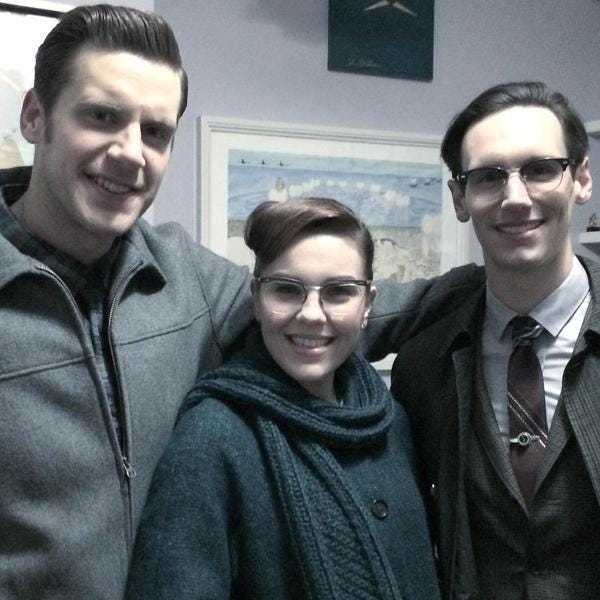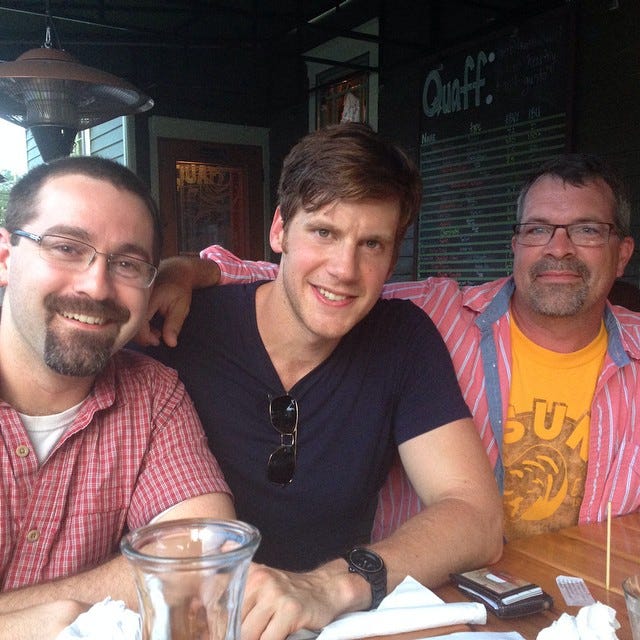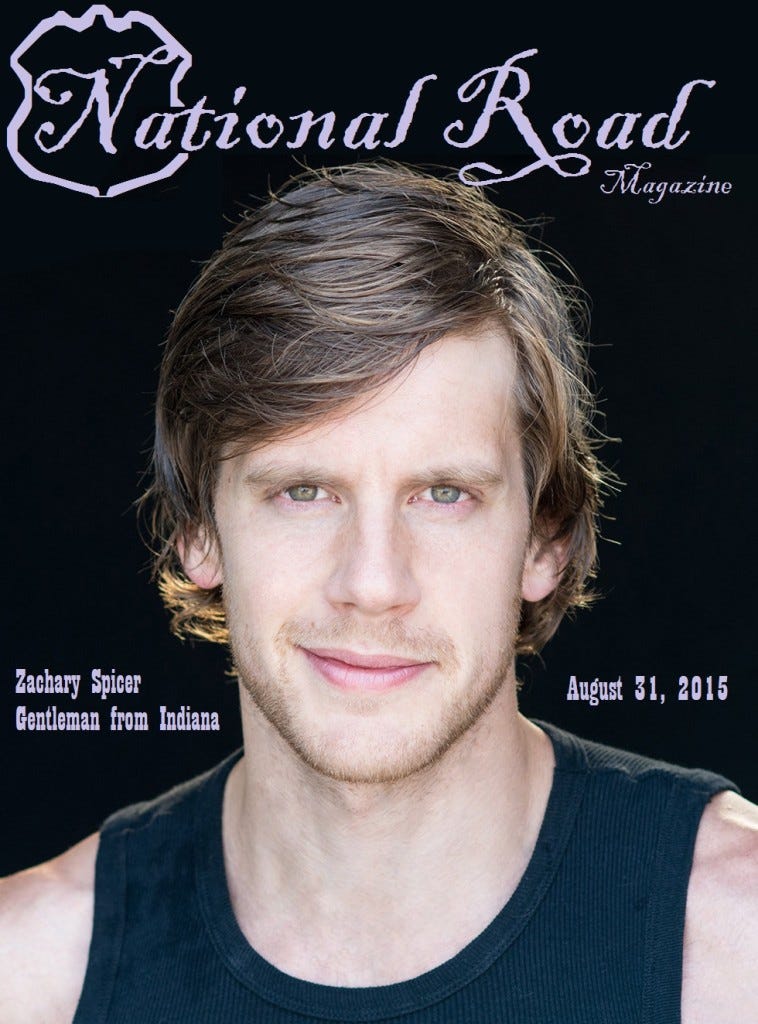Zachary Spicer: Gentleman from Indiana
by Donovan Wheeler cover photo by Kyle Lemaire additional photos courtesy of Thomas DeCarlo, Zachary Spicer, and Wendi Evans
[dropcap]B[/dropcap]y 7:00 in the evening, every seat at the Quaff On! Brew Pub in Bloomington was filled. It’s like this most evenings: partially because the brew pub cranks out great beer, partially because the atmosphere blends the perfect combination of hip and cozy, partially because it’s only a block off Kirkwood Avenue. But it’s mostly because it’s a Monday afternoon in Bloomington. You’re young, flaunting disposable income, living in a college town. No need for a box of penne and a jar of Prego when Kirkwood is right out there. Settled at a table on the deck, Wendi and I wait with Tom: a former student and one of our guests for the evening. After finishing college, Tom DeCarlo and his Greencastle high school friend Zach Spicer dove into a series of film projects using every schoolmate they could find, shooting everywhere from the city park, to the DePauw campus, to a local bar. They produced a handful of short projects, culminating in their 90-minute quo de grace, a largely ensemble piece called Exit 41. Tom now works at IU as communications coordinator. He writes, makes videos, works with students, and promotes all things IU. He’s smart. Very smart. And he carries polite demeanor with a wry grin and bit of Jedi-wisdom. Five minutes later my phone buzzes. Zach has arrived, and he can’t find us. A minute after that I round the corner, step inside the brew pub, and see him swiveling his head across the dining room. At 6’2” Zachary Spicer is not difficult to spot in a crowd. Muscular with a handsome chiseled face bearing an often innocent grin, when he sees me he beams, striding confidently my way. Zach, by the way, works in New York. If you’ve watched a little bit of television, then you’ve probably seen him. If you’ve been to a Broadway show or two, then maybe you’ve seen him there. Yeah, he actually does that. Days before Zach had returned to Bloomington (he graduated from IU almost a decade earlier) to star in two simultaneous stage productions as part of IU’s summer theater program: Shakespeare’s As You Like It and a stage adaptation of Booth Tarkington’s The Gentleman from Indiana. A few months before that, he appeared in a three-episode story arc on FOX’s Gotham playing a love-interest rival to the character destined to become The Riddler. Shortly before that, he appeared on an episode of CBS’s Blue Bloods sitting across a desk from Tom Selleck in one of his strongest television performances to date. And another handful of months before that, he was performing in New York alongside Kenneth Branagh and Alex Kingston in a Broadway production of Macbeth. A New York address and a Broadway/Hollywood resume stands a far distance from the beginning of an acting career which not even the affable Spicer could have predicted. From a high school stage production of State Fair in 2002 to a series local films created with his best friend, Spicer took his talents to Indiana and by his junior year had parleyed all of that into his first big break. Zachary Spicer: “A little while ago I went back and traced each step, each audition and tried to figure out how everything fell where it did for me…where it all stemmed from. And the result was interesting because I can exactly trace it back.” [divider style="solid" top="20" bottom="20"]
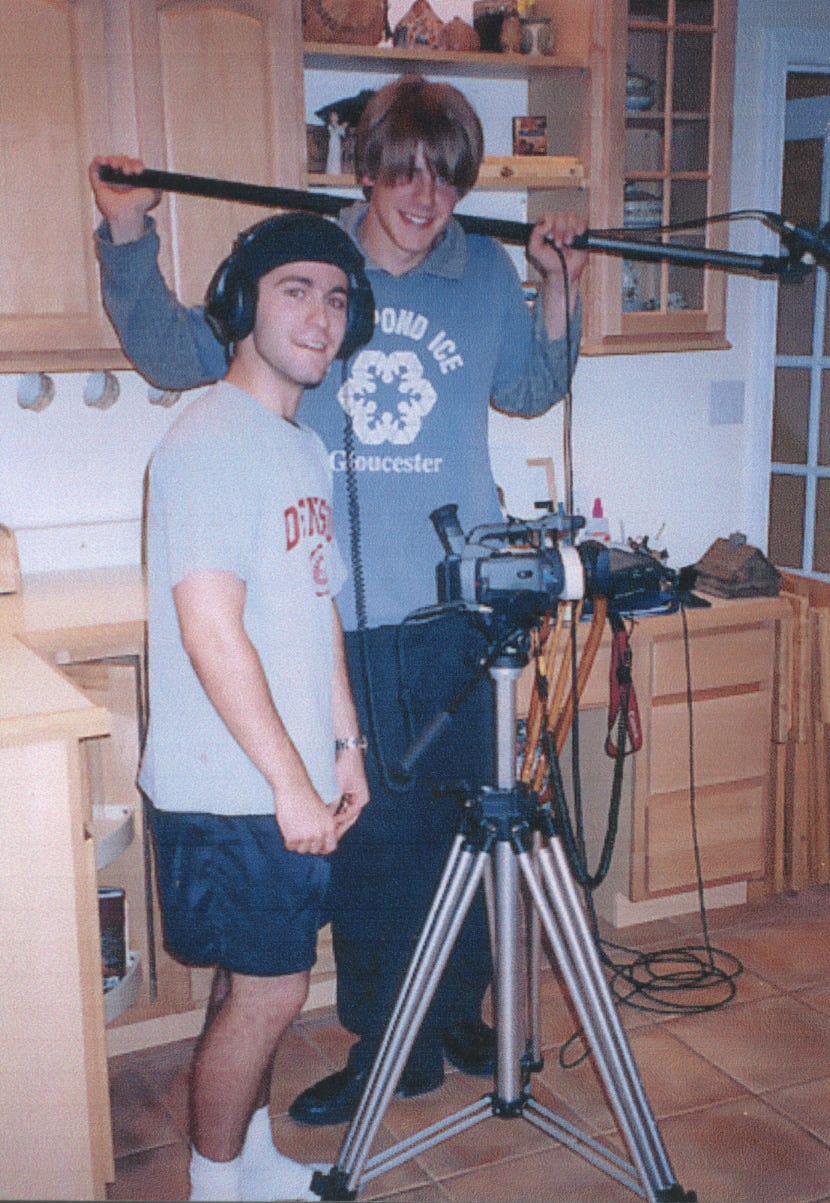
[divider style="solid" top="20" bottom="20"] [ads1] [divider style="solid" top="20" bottom="20"] Donovan Wheeler: You can? ZS: “Yeah. Exactly to each moment. It starts with [Greencastle High School theater instructor Vickie] Parker forcing me to do theater. The next step happened in college when Scott Lafeber, guest-directed at Indiana. At the time I was actually an anthropology major, and he said to me: ‘Whatever it is you think that you’re doing, you need to drop that. Go to New York. Study acting there.’ He specifically mentioned Circle in the Square, so I went there. Ted Mann—the Circle founder—saw me in a class performance and eventually directed me in his final production. He also introduced me to his neighbor, Bill Treusch, the man who is still my manager to this day, and Treusch has gotten me into every door since then.” [dropcap]“A[/dropcap]t first I didn’t envision him as an actor, except that he was tall and good-looking which are requirements, no doubt,” Parker told me when we had spoken earlier. “But we put on State Fair, and I don’t remember how I did it, but I convinced him to audition. I knew he could sing and could carry a tune.” “During his senior year I had the kids memorize twenty lines of Shakespeare,” Parker added. “I told them it would do them some good someday in the future when they’re watching Jeopardy. Zach told me that he was going to do Tom from the Glass Menagerie instead. He didn’t ask…he wasn’t belligerent… And I figured that, since he had already played Bottom in the spring play, I said, ‘Okay, that’s fine.’ When Zach stood up to play Tom, he brought goose bumps.” Settled in at our table on the deck, our server (her name is Abigail, but I think she called herself Abby) is outgoing and wants to make light banter. Spicer is enthusiastically willing to play along, and after letting her suggest his first beer, we discuss his recent trip back to Bloomington. DW: What made you decide to work on these productions at IU? ZS: “Jonathan Michaelson, the head of the IU theater department, has been talking to me the past couple of summers looking for an open time when I could come and do a production here. This summer worked out because I finally had some time off from my other projects. Honestly it’s more personal than even my feelings for IU. My grandfather is 94, and he just underwent pacemaker surgery. I wanted to come back to the area for that and spend some time with him. He also hasn’t seen me perform since I was down here as a student.” DW: What’s it like preparing for two different shows simultaneously? ZS: “It was crazy. Ten hour rehearsals per day…we would rehearse one play for five hours in the morning, and we’d spend the other five on the second play in the evening. We blocked both shows in about two days, which is really interesting because it was a stage ‘in the round’ with a cast of 17 people in both shows. When the audience is watching you from all sides, and you’ve got that many people moving around on that stage you really have to use experience and common sense as much as anything.” DW: Seems like a heck of a change after spending time on television. ZS: That [guest-starring in Gotham] was the coolest thing ever. They build all the sets inside these major studios. It’s called the Navy Yard, in Brooklyn. They have 14 airplane hangars, and almost the entire city of Gotham is built inside those hangars. It’s almost like the old West Wing set, where they built a nearly exact replica so they could film all those tracking shots. They built Gotham much the same way so that you could move naturally from one set to the next. Acting on that series was similar to ‘playing pretend’ when you’re a kid.” DW: What was Cory Michael Smith, who plays Edward Nygma, like? ZS: “The first time I saw him was when he worked in a play off Broadway in New York called Cock…referring to the chicken…which won a ton of awards. Then, when I worked with him on Gotham, I discovered that he’s a really nice, affable guy…very down to earth. This is something I’ve noticed about people who are in that business. Most of them, save a few, are very nice people. There are very few ‘divas,’ and no one is demanding any special requests or any of that sort of thing. Even Tom Selleck on Blue Bloods…he makes a point to introduce himself to you first because he knows that you’re nervous.” [divider style="solid" top="20" bottom="20"]
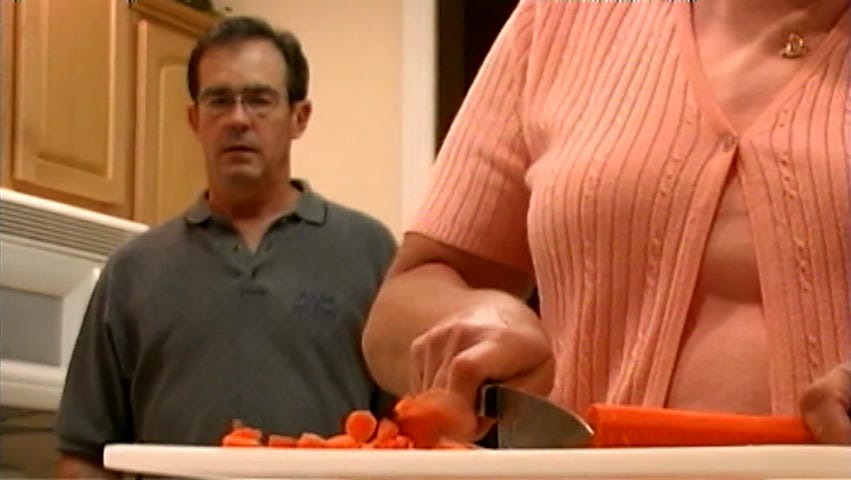
[divider style="solid" top="20" bottom="20"] [ads2] [divider style="solid" top="20" bottom="20"] [dropcap]S[/dropcap]itting beside me, Wendi laughs at this. ZS: “I know, right. It seems so funny. But people of that caliber, especially Selleck…they know that you know who they are, so they do that to remove the awkwardness. After they’ve initiated the conversation, everything goes smoothly the rest of the way.” DW: So, how different is the experience of prepping and acting for television compared to what you’ve done on stage? ZS: “When I worked on Gotham I didn’t have the full script for the scene I was shooting until the staff picked me up at 6:00AM. I knew what character I was playing, and I roughly knew the context of the scene. I learned later that my character, Tom Dougherty, was supposed to be part of a more extended, on-going love story. It was supposed to dig under [the eventual Riddler] Nygma’s skin for a while. But—the way I understood what happened, anyway—the ratings dipped, primarily due to a lack of action scenes. Viewers have been wanting to see the ‘bad guys’ progress and come out, so the show-runners kicked everything into gear real quick, and that was it for me.” Laughs. “In theater you have three or four weeks to rehearse and prepare for a show, but in TV—especially in TV—you have 24 hours…maybe…to develop a sense of character. And then all sort of other factors happen at the last minute, too.” [dropcap]W[/dropcap]hen we were seated earlier, I was oblivious to the stool and music stand at my back. The last time I sat on the deck at Quaff On! we enjoyed a quiet meal…but that was at 1:30 in the afternoon. When the guitarist and fiddler situated themselves and struck up “If It Ain’t Got That Swing” I glanced at recording app on my phone. Zach was transitioning from Gotham in general to one of those perfect little anecdotes. On my app’s meter, I couldn’t tell if the microphone was picking up Zach or the fiddle. For the record, I said nothing and let Zach continue. Off the record, I only made one casual observation about the predicament: a soft, internal “Well F***…” For the most part, I had no reason to worry. I’d lose a word or two in the next 45 minutes, but most of the time the app/mike combo beat the band. ZS: “In my final scene in Gotham—the death scene—that didn’t call for rain in the script. But then it actually rained while we filmed it, so the crew stopped production for four hours and brought in these huge lights which hung from cranes so that they could simulate lightening. They’re thinking was, ‘Well, if it’s raining, then we’re going to add to it and make it even more dramatic.’” DW: So this sort of thing happens often. ZS: “Often. I was in a pilot episode for another show, and they were rewriting lines as we were uttering them. That was a long process. We spent weeks on that project. We were in a scene, and the writer and executive producer were on set saying, ‘That scene isn’t working…say this instead,’ as they handed me a new script.” [divider style="solid" top="20" bottom="20"]
[divider style="solid" top="20" bottom="20"] [ads1] [divider style="solid" top="20" bottom="20"] [dropcap]O[/dropcap]ur server, Abby, returns. Are we ready to order? Tom, who has been patiently waiting to get to the part of Zach’s story which involves him, fires quickly: Tom DeCarlo: “I’ll have the mushroom and swiss.” ZS: “That sounds awesome.” [dropcap]W[/dropcap]endi and I take care of our requests, and the camera—metaphorically…obviously—turns to Zach. ZS: “You steered me right on the beer, so what you do recommend? Abby: “Do you like burgers?” As she recommends a three-meat specialty, which is also a promotional burger raising money for a non-profit organization, the longest rendition of “Ain’t Got That Swing” suddenly ends. Abby: “Are you on Instagram?” ZS: “Yeah…” Abby: “Are you above taking pictures of food? Some people are.” ZS: “I’ve never done it, but let me take a look at the burger and maybe I will.” Abby: “Well the photo is part of a contest.” [divider style="solid" top="20" bottom="20"]
[divider style="solid" top="20" bottom="20"] [dropcap]T[/dropcap]he swirling ambient noise now out of the way, we abruptly hear her mention the word “contest” to Zach. Tom, that bemused grin he used to wear as my student after successfully duct-taping my chair to the chalkboard, turns to her and snaps his fingers. TD: “Is the answer ‘If It Ain’t Got That Swing?’ I know that one. Abby: “No, you won something else.” Somewhere in the midst of the conversation, a single greenback appears floating from one hand to another, by the time our server has finished her statement, she’s holding it. The cue couldn’t have been better. Abby: “You won a dollar.” She throws him the bill, and we break into mass laughter. ZS: “This place is awesome!” [dropcap]I[/dropcap]n this era where you can become an overnight celebrity because you sang on a TV show or lost a lot of weight eating turkey subs, watching Zach be Zach was refreshing. He stared down Tom Selleck. He got murdered by the Riddler. He had daily chats with Sir Kenneth Branagh. And he worked his ass off in the process. He’s not household-name level, not yet at least. But he’s also not aloof either. DW: What was it like when you first got to New York? ZS: “I had never been to New York before moving there for Circle. He [pointing to Tom] drove me there.” TD: “I drove in, dropped him off, and got out of there as fast as possible.” ZS: “Because he was terrified…and rightfully so. He dropped me off in Yonkers…I think it was the corner of 223rd Street and Broadway. We both looked at each other and thought, ‘Broadway!’” TD: “The entire trip was an ad-lib, I might add.” ZS: “That’s true. Along the way we camped in the Finger Lake region and things like that. So, Tom says to me that he’s not comfortable driving much deeper into New York. I tell him that’s fine. I knew my school was somewhere around 50th Street…I had nowhere to live. So I walked…in August…from 223rd to 50th. It took about six hours.” Wendi: “You had your bags and everything with you?” ZS: “Yeah! I basically walked the length of Manhattan the first day I arrived.” TD: “That’s alright. I spent five hours sitting on the New Jersey Turnpike trying to get out of there.” [divider style="solid" top="20" bottom="20"]
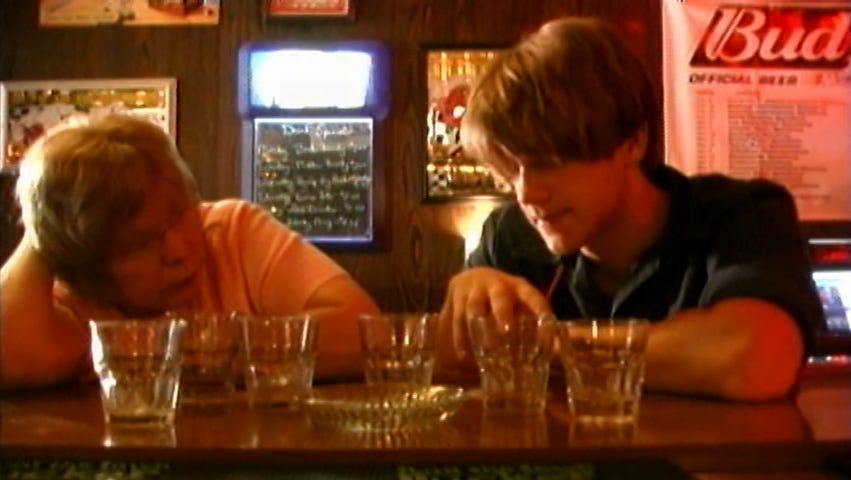
[divider style="solid" top="20" bottom="20"] [ads2] [divider style="solid" top="20" bottom="20"] DW: All of this happened with one more year to go at IU. What was it like coming back to Bloomington after all of that? ZS: “I come back to IU for my senior year after Circle…I know for certain that I want to be an actor, so I audition for everything. And this is the true irony of the whole story: I get cast in only one show my senior year, but the other two main-stage IU shows I auditioned for are Wit and Macbeth…the two shows I would later do on Broadway. In fairness to IU, I was terrible in those auditions. I walked into the Macbeth audition, and I was so scared because I’d never tried out for Shakespeare before. My hands were shaking so much I didn’t carry my copy of the Mark Antony monologue onto the stage with me. Then I got about five lines in and blanked. I couldn’t pull out any of the remaining words, so I said, ‘Thank you very much’ and walked out.” DW: But you did end up in Macbeth, with one of the biggest names in the business. ZS: “We rehearsed in London. I was one of two Americans in the cast, and they flew us over to prepare for the show. We rehearsed over there for three weeks, and then everybody flew here to put on the production in New York. DW: Describe working for Kenneth Branagh. ZS: “That whole process of putting you at ease…? He’s the king of that. I mean, he’s a knight…literally. In our first rehearsal we gathered around him, and everybody is ‘on point.’ Everybody is the best at whatever it is they’re doing. He calls us into a circle and gives us this inspiring speech and talks to us about how we must ‘all be Olympians’ and that we must treat these rehearsals as Olympic athletes treat training for the games. I’m standing there mesmerized, in awe because the first Shakespeare I ever saw was his Hamlet in high school. Listening to him give us that speech was like hearing him give the St. Crispin speech in Henry V. That was easily one of the coolest things I’ve ever been a part of. And to watch him work. He made the same demand that Cynthia Nixon did with Wit, which was that everyone be there all the time for all rehearsals. And none of us minded it. We loved it because we were watching Ken Branagh and Alex Kingston do these incredible scenes from Macbeth. DW: And all of this, high school theater aside, really started to happen for you when you and Tom made a series of films just after college. Your full-length project, Exit 41, is probably one of the most thought-provoking. How did that come about? ZS: “Well…” Here he laughs again. “I wanted to make a movie about a guy…” TD: “And life.” ZS: “And life.” ZS: “We knew that we wanted to make a movie about Greencastle, and at that time I had fallen in love with American Beauty. I loved the idea of this unspoken life and drama which happens in a town that seems perfect on the outside. I didn’t realize this until a couple years ago, but there were people who were really upset at the screening we held when we’d finished it. That really surprised me because when we were making the movie neither one of us was trying to say, ‘This town sucks!’ or any of that stuff. I actually have fond memories of Greencastle.” TD: “But everyone is cheating on one another.” ZS: “That’s true, but that was also coming from our high school perspective.” TD: “When I re-watched it about five years ago, I thought to myself, ‘That’s what this is about?’ There were so many details and moments I had forgotten about that were in the film. But my thought at the time, thematically speaking was that people sometimes get stuck in ruts. We saw that as an element of small town life, and what we wanted to do with the film was watch characters break out of that and fight for something new, something different, something bigger with their lives.” ZS: “Because that’s what we were going through at that time.” TD: “Sure.” ZS: “So, it shocked me when my mom told me that there were people who were angry at the screening, and they immediately left afterwards. At the time I didn’t think about that all. We were too caught up in just…getting the damn thing to play.” Laughs. “So, that was a little jarring.” DW: But imagine all that you learned doing that. ZS: “I teach acting for film and film technique in New York, and I see people who come in ranging from age 22 to older than 30, and they have no clue what it is to make a movie…what all the components are. So all the things we learned making that film were priceless.” TD: “I saw a presentation from a production company here in Indiana, and the two owners were talking about how they had no education…just bought equipment and started learning everything by the seat of their pants. Here they are presenting to this group of filmmakers, and I’m thinking, ‘I’ve learned everything they’re talking about when I was…’” ZS: “Seventeen!” TD: “Yes!” Laughs ZS: “I would come up with ideas for ridiculous shots. When we made one of our first short films—called River of Words—I turned to Tom and I said, ‘I really want a crane shot to start when we’re circling around the table, and then come up on top over Sacha (a classmate who was writing and acting in it)…I want it to come up and spin around and them come down onto the page.’ But we don’t have a crane. We don’t have a trolley. We don’t have anything. So Tom builds a crane out of PVC pipe and duct tape.” TD: “Well, I wouldn’t call it a ‘crane,’ but we accomplished it: two people, a LOT of duct tape, and ten dollars’ worth of PVC pipe.” [dropcap]"Z[/dropcap]ach is a risk-taker,” Parker had recently told me, “so he doesn’t see any problem as insurmountable…ever. They wrote the bar scene for Exit 41, but they were all underage. So they made arrangements to film before hours, early in the morning. They turned on a couple lights, but it was still pretty dark in there, and they tossed a couple glasses our way, and let us to shoot. Zach never thought, ‘I’m going to have change this scene.’ I’m sure his thought the whole time was, ‘I’m going to shoot this scene in a bar.’” I mention Parker’s comments to Zach, and he pauses. Humbled and honored. ZS: “I haven’t taken that to directing thus far, but since starting my own production company I certainly have taken that mindset into producing…which is a similar task in a lot of ways.” ZS: “Even though my only work thus far in ‘feature-length’ film production has been with Exit 41… he trails off, recollecting his thoughts…I would go out, audition for all kinds of parts, and get pretty far into the process. Then I wouldn’t land the role. For a long time I subscribed to the idea that the people who were in charge…the people who make the decisions were more talented and more skilled and more experienced than I was. So I believed that I should I let them make decisions. Then I finally reached a conclusion that these people, they’re not smarter, more talented, more creative…they just went out and did it. They rolled their dice and said, ‘We’re going to see what happens.’ That’s what we’re doing with The Good Catholic. None of us have the best idea of how to make a feature film on this scale, but we’re all saying, ‘Screw it’ and we’re going for it.” TD: “When we made Exit 41 we faced a lot cynicism throughout the process. When we borrowed the film equipment from DePauw, we told them what we were doing, and one of the instructors said to us, ‘That’s not going to happen. We have college students who spend a whole semester on this and can’t make a two-minute film. You’re going to make a 35-minute film in six weeks?’ And we said, ‘Well…yeah!’” Laughs. “Then we did it. And we went back the next year to borrow more equipment, and he said, ‘You’re not going to make a feature film.’ And…okay…we did it.” ZS: “At that point who cares if it’s great? Who cares if it’s genius? Just make something. Learn from it. Then make something else. And then just keep going. The last audience award winner at Sundance was shot on a smart phone. If we had these things back when we’re filming all our stuff when we were in college…? There’s absolutely no excuse for people not to get out there and create whatever it is you want to create.” [divider style="solid" top="20" bottom="20"]
[divider style="solid" top="20" bottom="20"] DW: How often do you think about that old, amateur film now? Given where you are professionally? ZS: “When I am teaching I reference it almost weekly. I make reference to the overall experience, but I also use it to emphasize that you need to find a kindred spirit who wants to join you in creating something. That’s invaluable. Sure there are a lot of people who can go off and create something by themselves, but I’m not one of those people. I need somebody there.” [dropcap]A[/dropcap]s Wendi and I drove away, we waited at a crosswalk for two young men to clear out of the way. It’s Zach and Tom, engaged in a conversation, gesturing, smiling, eyes alight, so engrossed that they never noticed us. When I turned the corner and headed out of Bloomington I kept replaying the image of them walking together. I think that maybe that moment best sums up the beauty of our own life journeys: you can go off to New York, even end up on TV, but when you’re next to your best friend, you’ll always be a 17-year-old kid. [divider style="solid" top="20" bottom="20"]


